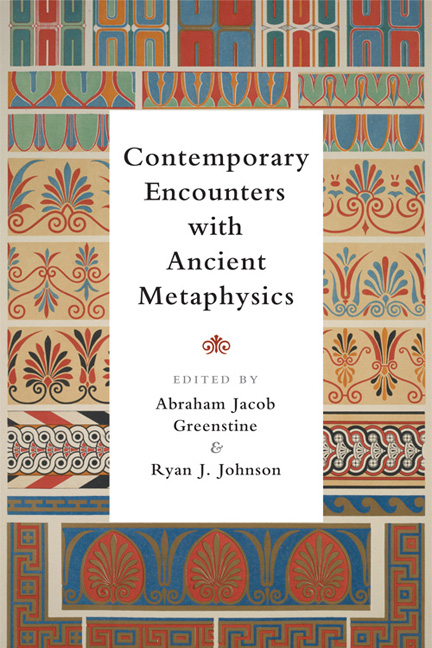Book contents
- Frontmatter
- Contents
- Acknowledgements
- Note on the Text
- Notes on Contributors
- 1 A Thousand Antiquities
- Part I Plato
- Part II Aristotle
- 7 Science Regained [1962]
- 8 Aristotle's Organism, and Ours
- 9 Does It Matter? Material Nature and Vital Heat in Aristotle's Biology
- 10 The Modern Aristotle: Michael Polanyi's Search for Truth against Nihilism
- 11 Diverging Ways: On the Trajectories of Ontology in Parmenides, Aristotle, and Deleuze
- 12 Object and Οὐσία: Harman and Aristotle on the Being of Things
- Part III Epicureans, Stoics, Skeptics, and Neo-Platonists
- Part IV Postscript
- Index
10 - The Modern Aristotle: Michael Polanyi's Search for Truth against Nihilism
from Part II - Aristotle
- Frontmatter
- Contents
- Acknowledgements
- Note on the Text
- Notes on Contributors
- 1 A Thousand Antiquities
- Part I Plato
- Part II Aristotle
- 7 Science Regained [1962]
- 8 Aristotle's Organism, and Ours
- 9 Does It Matter? Material Nature and Vital Heat in Aristotle's Biology
- 10 The Modern Aristotle: Michael Polanyi's Search for Truth against Nihilism
- 11 Diverging Ways: On the Trajectories of Ontology in Parmenides, Aristotle, and Deleuze
- 12 Object and Οὐσία: Harman and Aristotle on the Being of Things
- Part III Epicureans, Stoics, Skeptics, and Neo-Platonists
- Part IV Postscript
- Index
Summary
This book tries […] to re-equip men with the faculties which centuries of critical thought have taught them to distrust.
Modern scientism fetters thought as cruelly as ever the churches had done. It offers no scope for our most vital beliefs and it forces us to disguise them in farcically inadequate terms. Ideologies framed in these terms have enlisted man's highest aspirations in the service of soul-destroying tyrannies.
Modern fanaticism is rooted in an extreme scepticism which can only be strengthened, not shaken, by further doses of universal doubt.
It is the height of intellectual perversion to renounce, in the name of scientific objectivity, our position as the highest form of life on earth, and our own advent by a process of evolution as the most important problem of evolution.
Contemporary philosophy of science has been characterized as a debate between realists, idealists, and skeptics about whether science gives us knowledge, and if so what kind. Twentieth-century analytic philosophy featured a debate between logical empiricism, represented by Carnap, Hempel, Reichenbach, and others, and the historicist view of science associated with such philosophers as Hanson, Kuhn, and Feyerabend. The extreme version of this debate, perhaps not held by any of these, would pit a radical objectivism against an equally radical subjectivism. Within continental philosophy, meanwhile, the primacy of consciousness in the natural and social sciences has been emphasized, though it remains a question whether phenomenological and existentialist approaches to science differ significantly from idealism. The phenomenological work of Husserl, toward the end of his life, turned increasingly to the implications of the modern view of science for humanity, and, like Michael Polanyi, saw a correlation between the rise of irrationalism and the straitened outlook imposed on the world by modern natural science. Wilfrid Sellars, from the analytic perspective, provided a comparable critique based on the tension between what he called the manifest image and the scientific image of man. The relationship between science, the theory of knowledge, and the ethical-political implications of both thus came increasingly to the foreground. Contemporary disagreements about the understanding of science and its role tends to bolster the case for skepticism or relativism since, as Plato's Socrates says, intellectual wandering implies absence of knowledge.
- Type
- Chapter
- Information
- Contemporary Encounters with Ancient Metaphysics , pp. 180 - 201Publisher: Edinburgh University PressPrint publication year: 2017



